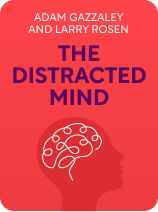

This article is an excerpt from the Shortform book guide to "The Distracted Mind" by Adam Gazzaley and Larry Rosen. Shortform has the world's best summaries and analyses of books you should be reading.
Like this article? Sign up for a free trial here.
How strong is the cognitive control network? Why is it easy for humans to fall for interference?
The cognitive control network guides us to achieve our goals in life. But it does have its limits, which is why humans get distracted so easily and sometimes can’t fulfill those goals.
Continue reading to learn how your cognitive control network might be failing you.
How Cognitive Control Limitations Make Us Susceptible to Interference
In The Distracted Mind, Adam Gazzaley and Larry D. Rosen argue that we’re susceptible to interference because our cognitive control network—the group of faculties that allow us to fulfill our goals—has limitations that make us susceptible to interference. To show as much, they examine these three faculties (attention, working memory, and goal management) to highlight their shortcomings.
Faculty #1: Attention
According to Gazzaley and Rosen, the first component of cognitive control is attention. They write that attention is similar to a spotlight since it allows us to attend to particular stimuli in our environment. For example, attention can allow us to focus on the car in front of us in a traffic jam, the scent of pretzels in a mall, or the crying baby in a movie theater.
When it comes to meeting our goals, Gazzaley and Rosen argue that the ability to focus on particular stimuli increases our brain’s efficiency by filtering out irrelevant information. For instance, imagine that you’re a concert pianist performing a concerto. Instead of fixing your attention on all the other stimuli present, such as the whispers of the crowd or the lighting on stage, you selectively focus on the piano in front of you to maximize your performance.
(Shortform note: Although scientists regularly liken attention to a spotlight, other experts suggest this comparison is mistaken. Indeed, while the spotlight comparison is meant to highlight our ability to attend to one single stimulus, some experts argue that we can simultaneously attend to two different visual stimuli. Consequently, they suggest that the spotlight comparison isn’t perfectly apt since we can “split the spotlight.”)
However, our capacity for selective attention has limits. In particular, Gazzaley and Rosen note that our attention can be derailed by environmental stimuli that catch our attention, such as sudden movements or loud noises. If, for instance, you’re conversing with a friend in a coffee shop, your attention might falter if your favorite song comes on the radio. Although this responsiveness to environmental stimuli originally provided survival benefits, such as alerting us to nearby predators, it now detracts from our goals by providing us with frequent interference.
(Shortform note: Although all environmental stimuli have the potential to disrupt our attention, certain stimuli prove more disruptive than others. Neuroscientists agree that emotionally significant stimuli—for instance, angry scowls and crying toddlers—are more likely to catch our attention. Though the reasons behind this are unclear, the experts speculate that the human brain is hardwired to perceive stimuli of personal and social import, which are inevitably tied to emotions.)
Faculty #2: Working Memory
Next, Gazzaley and Rosen discuss working memory, the faculty that allows us to retain key pieces of information in our mind over short time spans. They argue that working memory is crucial in executing higher-level goals because it allows us to decide how to act on the basis of past perceptions. For example, imagine that you’re driving to a new location after checking the directions at home; your working memory enables you to recall those directions and thus correctly decide which turns to make.
(Shortform note: In addition to working memory, our capacity for long-term memory, which allows us to store information for indefinite periods of time, aids us in accomplishing longer-term goals. For example, if you’re a law student with the goal of passing the bar, your long-term memory will prove crucial in helping you remember information from your first year of law school.)

———End of Preview———
Like what you just read? Read the rest of the world's best book summary and analysis of Adam Gazzaley and Larry Rosen's "The Distracted Mind" at Shortform.
Here's what you'll find in our full The Distracted Mind summary:
- How technology has made us more prone to distractions and interruptions
- How to modify your environment to reduce distractions and boredom
- How to minimize your susceptibility to interference and improve cognitive control






